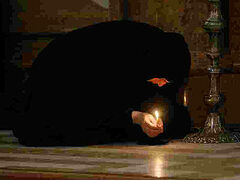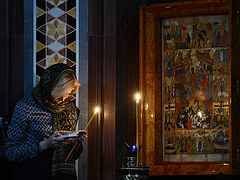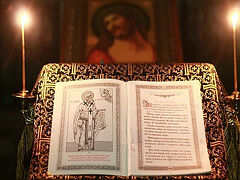Let my prayer arise, in Thy sight as incense (Ps. 140:2).
Alas, how weak and impure everything is within us, even the best and most perfect! If anything precious remained in our nature from its primitive perfection, then it’s prayer, by which a man instantly raises above everything earthly and corrupt, higher than the heavens and all things created, comes to the throne of God Himself, and enters into direct communion with Him. With prayer, everything evil and gloomy immediately droops low in the soul, and everything pure and good comes to life and receives strength; with prayer, the mind brightens, the senses soften, the will becomes free, the conscience becomes clearer, the soul calms down, and the body itself is put in order and becomes not so earthly and heavy. Prayer is, as it were, a kind of contact with the Godhead, bringing supernatural power down into us and changing our entire being for the better.
But alas, the inherent corruption and impurity of our fallen nature are so great that they penetrate our very prayer to the point that they often take away all its power, making it dead and barren. And if only barren! There are also such prayers that turn into sin on the part of the one praying. Thus, the holy Church, among other subjects of petitions, teaches us to pray about our prayer itself, that it might be as it ought: Let my prayer arise, in Thy sight as incense.
“Arise” from what? From heaviness and encumbrance, from coarseness and impurity, lethargy and lifelessness.
Forcing themselves, the most sensitive people can stand for a few hours in prayer. But for insensitive people, standing in prayer, especially for a long time, is always a kind of labor after which they even need bodily rest, or they won’t be able to do anything else for a time. Is it not a sign that the spirit of prayer has so withdrawn from us that it has become as if foreign, having nothing in common with us? For prayer itself shouldn’t be a burden and labor for us, but a joy, peace, and pleasure. Look at the angelic world—they don’t have our needs or temptations, our sorrows and woes, and yet the Cherubim and Seraphim surrounding the throne of God cry out: Holy, holy, holy, is the LORD of hosts (Is. 6:3); they cry out and never grow weary. Why? Because prayer is a necessity of their being. For the celestials, to grow weary of praying would be like us growing weary of breathing.
Do we, beloved listener, seek this sleepless prayer of the Seraphim for ourselves? May those who can, accept this high gift! For us, it would be no small gift if our prayer at first ceases to be like a rock on the back of our neck, holding us down to the earth; if we, at least in the midst of our temporary prayer, wouldn’t be like wingless birds that want to rise to the heights and immediately fall out of the sky.
Thus, “Let my prayer arise before Thee, O Lord!” May my cold and unfeeling heart at least be like the censer I behold during the Divine services! As with a censer, after filling it with fire, incense irresistibly ascends upward to the vaults of the church, so let my thoughts and feelings soar to the throne of Thy grace, when the holy Church ignites them with the fire of its prayers and hymns! As a censer becomes lighter when the incense flies out of it, so do I become lighter in heart and spirit after prayer, ready to do good deeds!
The second failure of our prayer is its crudeness and impurity. On our own, we know not what we should pray for as we ought (Rom. 8:26). But even taught to pray as we ought by the Lord Himself, we don’t pray as though we’ve been taught. It’s instilled in us to pray—may His Kingdom come and His will be done, on earth as it is in Heaven (Mt. 6:10), but we would like, through our prayer itself, to extend our own dominion over everything and subordinate everything to our blind arbitrariness. We’re permitted only to ask only for our daily bread, that is, as many earthly goods as are necessary for our short time on earth, but we would like to seize all earthly goods. We would rejoice and have fun if no one had any bread left, and it was all in our storehouses. We’re forbidden to come before the face of God without having reconciled with our brother, without having forgiven the debts of those who slander us, that is, everyone who is guilty of anything before us; and we who are vindictive, are ready, sometimes in the very midst of prayer, to entreat revenge on our so-called enemies. What enemies? Enemies who sometimes suffer far more from us than we do from them. All of this and much worse comes from the fact that our prayer, instead of the fragrance of faith and love, spreads the deadly stench of pride, malice, and covetousness around us.
How then, beginning to pray, can I not first of all raise up a voice saying with humility: “Let my prayer arise… before Thee,” Lord! May all earthly and impure thoughts depart from me! May I recognize my true needs, above all; may I not forget my sinful poverty and the need to amend my life at this time, and may my spiritual renewal become the first and last object of my desire and petitions before Thee! But if I, a fool, having forgotten all this, ever appear in Thy church, O Lord, with sensual desires, with petitions that would be injurious for me if fulfilled, then may my heart be like an extinguished censer during this impure prayer! When it no longer has the incense of faith and love, then at least let not the pestilential stench of malice and deceit come from it! Let my tongue cleave to the roof of my mouth (Ps. 136:6), that I might be unable to speak!
Finally, our prayers, even in their most purified form, are for the most part weak and lifeless, and therefore ineffective. We sometimes pray for spiritual goods, for example, for the coming of the Kingdom of God, but so feebly as if these goods either don’t actually exist or aren’t worth much. We sometimes ask to be freed from sins and passions, but so coldly as though our wicked life were an evil of no great importance, from which it wouldn’t be bad to be freed , but with which, however, we could live without much harm until death. We seemingly give our fate and that of our loved ones over to the will of God, but almost like how we call ourselves the most humble servants of all—that is, in words alone, without thinking we’ve committed ourselves to anything. Instead of reviving us and strengthening us on the path of life, such a weak and lifeless prayer often weakens our conscience, plunging us into spiritual recklessness. After such prayer, we’re just as weak for good deeds, just as infirm to fight temptations and passions, just as inconsolable among sorrows and temptations and often almost further from our salvation.
How can we help this impotence and lifelessness in prayer? The same way you help a fading censer—by fanning the previous flame, or starting a new one. Where can I get the breath and fire for this? A certain part of both can be found, with the help of God, within our very selves. From intensified, oft repeated reflection on the hapless state of a sinner like ourselves, a certain waft of thoughts may occur that isn’t capable of stimulating the fading prayer. From the movement of spiritual feelings—at the thought of God, eternity, our Savior and His sufferings—a warmth can be born in the heart, which turns into prayer. But let none be deceived—all this isn’t enough for our prayer to become like fragrant incense. For this, a breath from above is needed—the grace of God; the immaterial fire of the Holy Spirit is needed, which, according to St. Paul, passes to the dividing asunder of soul and spirit, and of the joints and marrow (Heb. 4:12), consuming everything impure and sinful in them. For the man upon whom the Spirit “blows … as is meet,” which, in the expression of the holy Church, “taketh him away from among the things of the earth,”[1] is no longer so much the man who prays as much as the Spirit of God, interceding in him and for him with groanings which cannot be uttered (Rom. 8:26). And the man? In the midst of this prayer of the Spirit, according to the testimony of people who have experienced this state, it’s like metal penetrated by fire. Then no impurity can cling to the soul, or it immediately disappears of itself. Then the whole world is forgotten; there is no other feeling but the all-filling and all-replacing presence of God; there are no other desires, save that which St. Peter had on Mt. Tabor: the thirst to remain in this blessed state forever. The flesh, having become spiritualized, either remains silent, as if non-existent, or soars after the spirit and is ready to pour out tears and fly away in lamentations. Then it’s no longer the mind and will, but the whole being of man, like incense in the sight of God. St. David sought and desired this state when he cried out in his prayer to the Lord: For my heart was fired! (Ps. 72:21). And when this Heavenly fire descended upon him, his heart poured forth a good word, and his tongue became the pen of a swiftly writing scribe (Ps. 44:1).
Someone may ask how to attract such grace of the Spirit into the heart. Above all, beloved, by humility and a sense of our insignificance, constant prayerful desire for the grace of God, and purity of thoughts and intentions! A humble heart and a contrite spirit the Lord will never despise (Ps. 50:19)! The soul that desires prayer and grace will never be left without the help of the Holy Spirit! Amen.




